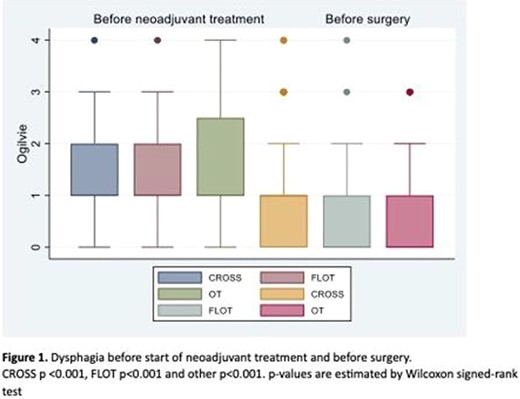-
PDF
- Split View
-
Views
-
Cite
Cite
Jessica Ericson, Fredrik Klevebro, Berit Sunde, 502. COMPARING NEOADJUVANT TREATMENTS REGARDING DYSPHAGIA AND WEIGHT CHANGES FOR PATIENTS WITH OESOPHAGEAL OR GASTRO OESOPHAGEAL CANCER, Diseases of the Esophagus, Volume 37, Issue Supplement_1, September 2024, doae057.238, https://doi.org/10.1093/dote/doae057.238
Close - Share Icon Share
Abstract
Dysphagia is the main symptom for patients diagnosed with cancer in the oesophagus or gastro oesophageal junction (GOJ), but there are lack of recent studies confirming this. Several studies have reported relief of dysphagia during neoadjuvant treatment but there might also be side effects affecting nutritional status resulting in weight loss. We wanted to investigate if there are differences between the mainly used neoadjuvant treatments in Sweden today, namely CROSS, FLOT, and other treatments (OT), for example prolonged neoadjuvant treatment due to oligometastatic cancer. Aims of this study was to investigate dysphagia, weight changes, and main causes of healthcare referral.
All patients with cancer in the oesophagus or GEJ receiving neoadjuvant treatment followed by subsequent oesophagectomy at Karolinska University hospital in Stockholm, Sweden January 2017 to June 2022 were included in the study. Data were extracted from the local prospective database and the electronic medical records.
To grade the severity of dysphagia we used the five graded Ogilvie score. The weight as well as the dysphagia score was evaluated before oncological treatment and before surgery. The patients were divided into three groups, them receiving CROSS, FLOT and OT, respectively.
There were 69 patients receiving CROSS, 68 receiving FLOT and 28 receiving OT.
The patients experienced relief of dysphagia in all groups, CROSS p<0.001, FLOT p<0.001 and OT p<0.001.
Patients receiving CROSS lost 1.32 kg weight (-8.5 kg to 6.4 kg), while those receiving FLOT gained 0.08 kg (-5.5 kg to 11.1 kg) and OT lost 0.49 kg (-20 kg to 8 kg).
Dysphagia was the main symptom for patients diagnosed with oesophageal cancer or GEJ (65%), other causes (9%), followed by anaemia (8 %), reflux (6%), pain (6%) and au passant (5%).
All groups experienced statistically significant relief of dysphagia during the neoadjuvant treatments. There were small differences in weight changes between the treatment groups, although patients undergoing chemoradiotherapy treatment lost more weight compared to those only receiving chemotherapy. Main cause of referral is dysphagia.
Oesophageal cancer, neoadjuvant therapy, dysphagia, weight




